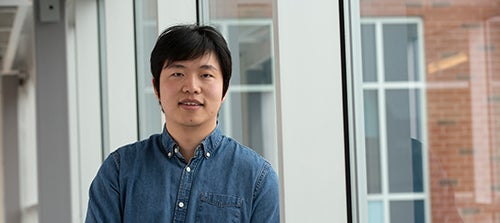Statistics and Actuarial Science PhD candidate Rui Qiao was one of the six students who won the 2019 Huawei Prize for Best Research Paper by a Mathematics Graduate Student. This award recognizes the impact of his Deep learning enables de novo peptide sequencing from data-independent-acquisition mass spectrometry with a prize of $4,000.
The paper co-authored by Rui Qiao along with his supervisor Ali Ghodsi, Ming Li, and others, discusses the development of a deep-learning-based model for de novo DeepNovo11 which sequences using data-dependent acquisition (DDA) data. The key idea is the application of data-independent acquisition (DIA) mass spectrometry data along with de novo sequencing to identify new peptides in human antibodies and antigens.

Currently identifying and validating neoantigens for cancer treatment remains a challenge when working towards personalized immunotherapy. Using neural networks, the research team was able to capture new data and patterns.
“Rui has proposed different new ideas and improvements to our original DeepNovo model,” said Ming Li. “He has designed the models for DIA data by considering the profiles of a peptide shape from several consecutive spectra. He has also incorporated the retention time and several other parameters.”
The technical breakthroughs proposed and improved by Qiao enabled this new approach which was published in Nature Methods.
The 2019 Huawei Prize for Best Research Paper by a Mathematics Graduate Student would not be possible without the generous support from Huawei.